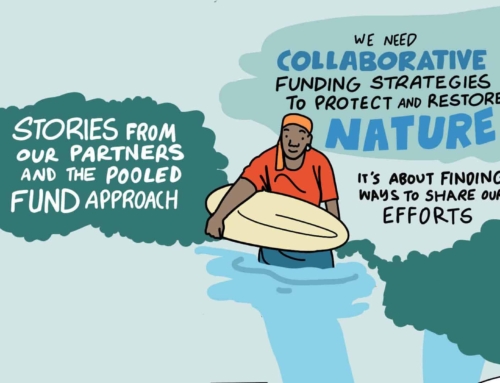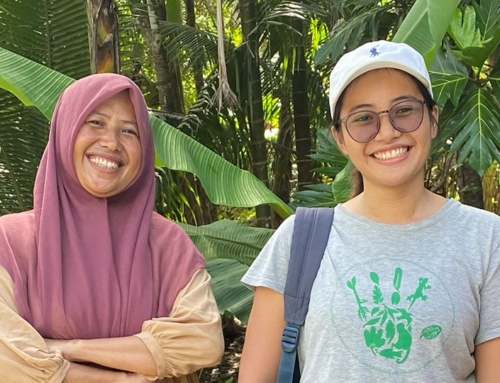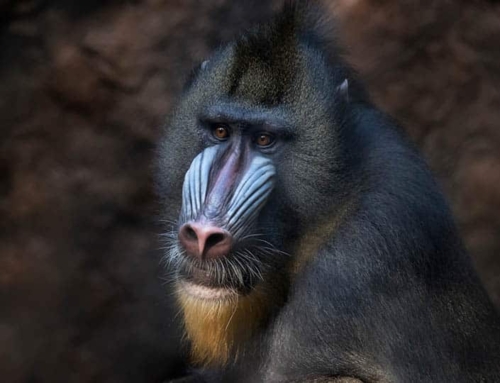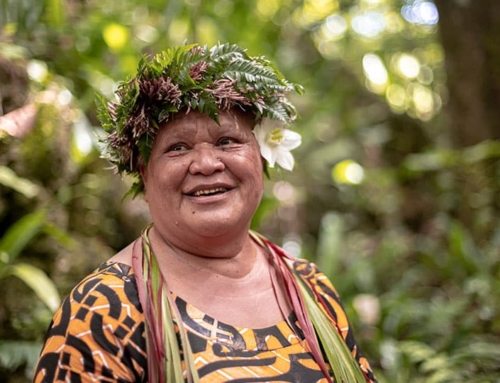The type of environment news that makes the headlines can be disheartening.
But when we take a closer look, there are so many positive and inspiring stories – of welcome progress, community triumphs, and conservation success.
Here’s some good news you might have missed from our partners in the Democratic Republic of Congo (DRC).
Women’s land rights officially acknowledged for the first time
In 2018, Synchronicity Earth started to support CFLEDD, a women-led organisation based in the DRC. At that time, CFLEDD President Néné Mainzana described Kaisai Oriental Province as the DRC’s ‘forgotten province’. People living there struggle, she tells us – and for women, even more so. Under the patriarchal culture of the communities they belong to, women are largely excluded from discussions on land management.
Néné explains: “If you go to any of the villages, it’s the women who go into the forests, every day. The forest is their supermarket, their pharmacy. It’s the women who are in the fields every day, and who do 80 or 90% of the work. Women should have a say in how the land is managed.”
This became Néné’s mission: she knew, for the sake of the environment – and all the people whose lives depend on it – something had to change. No other donor was supporting this work, but we said ‘let’s do it’!
Initially a project of just four women, CFLEDD has grown into a network of over 300 members and organisations, working to conserve the environment by ensuring women’s rights are recognised in new land and forest governance codes.
A few years ago, women from two communities signed a land agreement with local chiefs to manage their own land, and with CFLEDD’s help they requested community forests.

Women from Bakwa Tshiya village in Miabi territory received the official decree of their community forest during a ceremony with provincial authorities. © CFLEDD
The good news
Last week, Néné left us a voice message. It was the good news we had been waiting for: CFLEDD received the official decrees, successfully securing two community forests – of 500ha and 768ha – for women in Miabi and Kabeya Kamuanga territories in the Kasai Oriental province.
This is the first time that women’s land rights have been officially acknowledged in the DRC – a huge achievement to celebrate!
On top of this, a new provincial law for the recognition of women’s land and forest rights in the Kasai Oriental province has just been promulgated and signed by the governor. Other provinces are now working towards similar laws.
We are hopeful that this progress, resulting from CFLEDD’s ground-breaking efforts, sparks a series of new community forests for women in the DRC.

The DRC contains over 50% of Africa’s tropical rainforests. This megadiverse ecosystem is the only place wild bonobos can be found. © iStock
Sacred sites protected with two new community forests
More to celebrate from the DRC, from our partner Dynamique des Groupes des Peuples Autochtones (DGPA), a large network including indigenous forest peoples’ groups. DGPA work to secure Indigenous rights and promote the crucial role these communities in play as guardians of their forests, protecting the biodiversity within them.
Patrick Saidi Hemedi, who coordinates DGPA, informed us that two new community forests – totalling 30,925 ha – have been secured for the Indigenous communities of Booke and Mpengomondo in the Mai Ndombe province. By securing their ancestral land, these community forests also safeguard important sacred sites for Indigenous Peoples.
Having supported DGPA since 2014, we are delighted to see their continued achievements.

DGPA supports forest peoples to have the freedom to live according to their own way of life and customs, to have access to their traditional territories, and protect and validate their traditional knowledge. © Chris Scarffe
CORAP’s fight for electricity access wins DRC’s trophy for Alternative Voice of the Year
The Coalition of Civil Society Organizations for Reform Monitoring and Public Action (CORAP) was created in 2013 to mobilise local communities – aiming to influence state policies that improve the wellbeing of Congolese people.
A large part of this work has focused on the electricity sector: in 2021, 80% of the Congolese population had no access to electricity. Emmanuel Musuyu, who coordinates the coalition, has received recognition for his leadership in CORAP’s campaign for clean, reliable and affordable energy. This involved informing communities about the fundamental right to access energy and putting pressure on governments to consider Congolese people’s concerns.
As a result of these efforts, CORAP has won the prestigious trophy for Alternative Voice of the Year in the DRC.
Our Congo Basin Programme is proud to support CORAPs action to access sustainable energy and empower Congolese communities to fight for this right.

CORAP are determined to make the voices of their communities count, and will continue to put pressure on Congolese leaders, calling for improved electricity services. © CORAP





